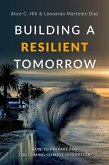"The Presidents and the Planet: Climate Change Science and Politics from Eisenhower to Bush tells the story of the world's greatest environmental challenge through the eyes of the early climate change pioneers. The four-decade narrative begins in the 1950s, when American scientists first began to warn about the risks of pollution that might change the natural climate in dramatic ways, the national media began to cover the story, and congressional committees received early testimony on the topic. It ends in the early 1990s, by which time global efforts to confront the challenge were advancing while political controversy had begun to undermine U.S. leadership, which had been prominent on previous threats to the environment. The Presidents and the Planet also tells the stories of the major players in the history of climate change science. The genial, big-picture oceanographer Roger Revelle exerted influence on eight White Houses during his lifetime and even one after his death (when his former student Al Gore Jr. served as vice president). The soft-spoken and cerebral William Nordhaus had already written seminal works on climate change when President Jimmy Carter appointed him to the Council of Economic Advisors. Four decades later, the Yale professor won the Nobel Prize in economics for his lifetime of work on the subject. These and other academics had more impact than generally recognized on how the upper echelons of government viewed climate change. Some political pioneers on the climate issue, such as Gore, are well known, though there is more to tell. But who remembers John Chaffee? During the Reagan years, this Republican from Rhode Island was the first committee chair in the Senate to offer concrete solutions to the risks of climate change. The drama reached a full pitch in the George H.W. Bush years when an administration filled with strong advocates for climate action and staunch foes of government regulation wrestled over the direction of U.S. energy and environmental policy. To better understand the often-surprising twists and turns of the climate debate in America, author Jay Hakes explored the archives and writings of influential scientists and the pivotal reports of the National Academy of Sciences. He also traveled to presidential libraries to discover how commanders-in-chief and their science, economic, and political advisors addressed the issue. With the advantage of hindsight, congressional hearings dating back to the 1950s took on new relevance. The Presidents and the Planet offers fresh new information that will move the goalposts for when we first "knew" about climate change"--
Hinweis: Dieser Artikel kann nur an eine deutsche Lieferadresse ausgeliefert werden.
Hinweis: Dieser Artikel kann nur an eine deutsche Lieferadresse ausgeliefert werden.








